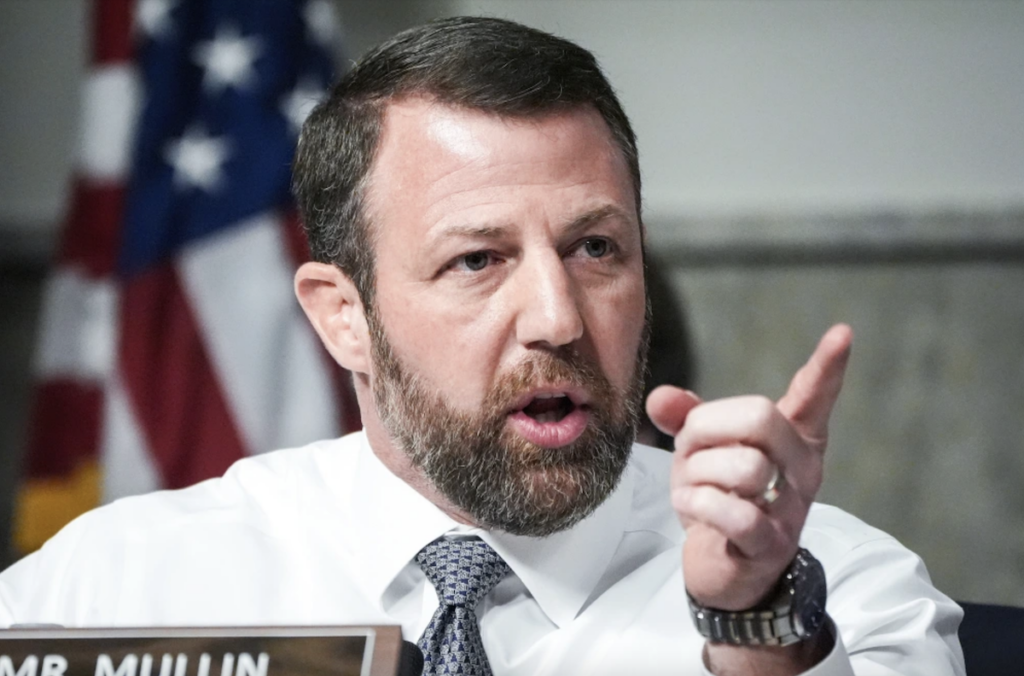The Hill: Why Senator Mullin is blocking the MEGOBARI Act and where Frontera comes in
Mullin is blocking the MEGOBARI Act
Republican senator Markwayne Mullin is blocking the passage of the MEGOBARI Act, which would impose sanctions on leading figures from the ruling Georgian Dream party, The Hill reports, according to sources.
The MEGOBARI Act, introduced in the House of Representatives in May 2024 by Republican congressman Joe Wilson, requires the US president to impose sanctions on members of the Georgian Dream government and others deemed a threat to Georgia’s stability, security and democracy. The bill obliges the president to sanction regime officials, their supporters and family members. The sanctions include visa restrictions and asset freezes.
The legislation also calls for a full review of US–Georgia relations, including all aid programmes.
In May 2025, the House of Representatives approved the MEGOBARI Act. It now needs to be passed by the Senate, before the final step of being signed by president Donald Trump.
- U.S. House passes MEGOBARI Act against Georgian Dream: what it says and what’s next
- Politicians, judges, propagandists and businessmen — who in Georgia will be targeted by MEGOBARI sanctions?
- British MP: ‘There’s a 6 or 7 out of 10 chance that sanctions will be imposed on Ivanishvili — and he’s already very afraid of it’
The Hill writes that in late August senator Markwayne Mullin persuaded Senate majority leader John Thune to exclude the MEGOBARI Act from the National Defense Authorization Act (NDAA).
Including the MEGOBARI Act in the NDAA would have been the quickest way to create serious obstacles for the Georgian Dream government.
News that Mullin was opposing the MEGOBARI Act was first reported in late August by journalist Alex Raufoglu, who covers the Caucasus in Washington, quoting sources.
Earlier this year, Mullin also blocked a request for the MEGOBARI Act to be fast-tracked.
In May, Republican congressman Joe Wilson published on X a list of individuals the US would sanction first once the law is passed. It included senior government officials, judges, businessmen and Georgian Dream propagandists.
The document states that “these individuals are helping Bidzina Ivanishvili, Georgia’s shadow ruler, to seize power in the state and place the country under the influence of China, Iran and Russia.”
Markwayne Mullin’s shift in position

The Hill says that Oklahoma senator Markwayne Mullin’s position “has raised eyebrows,” noting that it is now radically different from his stance on Georgian Dream five years ago.
In 2020, Mullin criticised the Georgian Dream government for moving closer to “America’s adversaries and enemies,” arguing that this made it harder and more dangerous for US companies to operate in the country.
The Hill notes that Republican senator Rand Paul is also against the MEGOBARI Act, but Mullin’s opposition stands out in particular.
“Many people support this bill. Last year it was close to being included in the National Defense Authorization Act (NDAA). The fact that one senator was able to block it is very disappointing,” an anonymous source told the outlet.
In a brief interview with The Hill, Mullin cited a “better relationship” with Georgian Dream prime minister Irakli Kobakhidze as one of the reasons for his change of heart.
“I understand kind of where they’re [Georgian Dream] trying to get to. I also understand the direct influence that Russia is having … and so I want to be able to work with them before we throw sanctions on them. I want to work with them to see how they can … have true sovereignty, to get away from the overbearing influence of Russia,” Mullin said.
In an article published on 1 July 2020, Mullin described Georgian Dream founder and billionaire Bidzina Ivanishvili in stark terms:
“Georgia is controlled by Bidzina Ivanishvili, an oligarch educated in Russia who made billions off the corrupt fire sale of Russian assets after the collapse of the Soviet Union.
Ivanishvili is a Putin ally who has deliberately forced out US companies legally operating in Georgia, such as Frontera.”
- Kobakhidze writes to Trump, wonders why US hasn’t responded to his offer to “restore strategic partnership”
- “US is not paying enough attention to Georgia”: Georgian president’s letter to Donald Trump
What is Frontera?
The Hill also examines the shifting stance of US oil company Frontera, which once loudly and actively criticised the Georgian Dream government but in recent years has noticeably softened its tone.
Frontera Resources was granted a licence to explore and extract oil in the Kakheti region in 1997, during the presidency of Eduard Shevardnadze.
Between 2012 and 2016, the company made several high-profile claims about large oil reserves in Kakheti. The newly elected Georgian Dream government treated these claims with suspicion.
The conflict escalated in 2017, when the state oil and gas agency filed an arbitration case against Frontera, accusing it of failing to meet its obligations.
The details and outcome of the proceedings remain classified. However, in 2020 the government said the arbitration had found a significant breach of contract, giving Tbilisi grounds to terminate the deal.
Despite publicly signalling its readiness to do so, the government never cancelled the contract. The economy minister at the time explained the decision as necessary to “maintain the country’s reputation as a model investment environment.”
The Hill cites Radio Free Europe/Radio Liberty as reporting that the US company owes the Georgian government 15.4m lari (around $5.7m), which a state corporation has deemed “irrecoverable.”
Frontera’s founder donated to Mullin’s campaign
The Hill notes that Frontera founder Steve Nicandros has donated up to $6,000 to Mullin’s election campaigns since 2020.
The outlet also quotes Mullin as insisting there is no link between Frontera’s improved relations with the Georgian government and his own decision to oppose the MEGOBARI Act.
“It doesn’t make any difference what company it is. If we’re going to have investments there, they need to make sure their investments, meaning U.S. investments, that investments need to be protected and have confidence that they’re going to be able to see the project through without being threatened to be taken over. I think we’re there. But some of the intergovernment politics is dicey. I mean, it’s a tough area.” Mullin said.
The Oklahoma senator added that he last visited Georgia in 2021 and plans to return. Asked if he could give a date, he replied: “No, that’s not for you to know.”
The Hill also writes that it sought comment from Frontera, but the company did not respond.
Senators call Mullin’s stance “puzzling”
According to The Hill, Mullin’s optimism about the Georgian government has baffled members of Congress.
“That a senator is going this far to defend the pro-China government in Georgia is puzzling and very swamp-like behavior. This is a regime that is constantly defending China and Iran and just today was insulting President Trump,” a Republican congressional aide told The Hill.
Senator Roger Wicker, a Republican from Mississippi, told The Hill that the MEGOBARI Act could still be added to the National Defense Authorization Act (NDAA).
Senator Jeanne Shaheen, a Democrat from New Hampshire, said the bill enjoys bipartisan support and that she intends to keep working with Republicans to secure its passage in the Senate.
“There continues to be strong, bipartisan and bicameral support for the Megobari Act in response to the deteriorating political situation in Georgia and widespread agreement that actors responsible for undermining Georgia’s democracy, Euro-Atlantic aspirations and our longstanding bilateral relationship should be held accountable,” Shaheen said.
News in Georgia



















